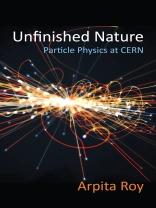The discovery of the Higgs boson in 2012, the culmination of a decades-long search, is one of the singular triumphs of particle physics. Advanced experiments at the Large Hadron Collider at CERN (the Conseil Européen pour la Recherche Nucléaire) near Geneva detected the long-hypothesized particle, resulting in the 2013 Nobel Prize in Physics. Drawing on two and a half years of in-depth fieldwork spent among CERN’s research community during this critical period, Arpita Roy offers a rich analysis of science in the making.
To what extent are scientific discoveries a matter of empirical findings? How do scientists at the farthest reach of abstraction understand their work? Unfinished Nature delves deep into this particle physics laboratory to distinguish the modes of reasoning that animate scientific discoveries and innovations. Demonstrating a deep knowledge of both contemporary physics and the methods of qualitative social science, Roy considers what scientists have to say about their commitments and concerns, the sources and vision guiding their experiments, and the questions they ask of themselves and others. In so doing, she argues that finding new facts in experimental physics turns on conceptual leaps, not necessarily empirical results. A sophisticated interdisciplinary ethnography of a scientific community, Unfinished Nature offers provocative insights into the nature and production of scientific knowledge.
Tabla de materias
List of Illustrations
Foreword
Acknowledgments
Introduction
1. Finding the Higgs Boson
2. Nature and Signature
3. On Orientation
4. The Cycle of Work
5. Art, Science, and Postmodernism
Epilogue
Notes
References
Index
Sobre el autor
Arpita Roy is a lecturer in anthropology at the University of California, Berkeley.












